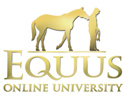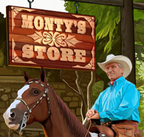I have watched the video's of Monty join up with all the horses and I noticed each time he turns them, they face the boards or fencing, as does STAR.
Yet in the other traning methods I have watched or read about the horses turn their heads outward toward you when they are turned.
I was wondering why the difference?
There has to be a reason or Monty would'n do it.
← back
My Join-Up® Experience
join-up, turn in or turn out?

Rewards
Subscribe to Equus Online University and become a part of Monty's worldwide mission to leave the world a better place for horses and for people too.
Students automatically gain access to special rewards, such as exclusive discounts at the Monty Roberts Online Shop. Visit Monty Roberts Online Shop.



Ronda
If you notice most trainers will have their horse on a lead line when they are lunging them. While Monty has his horses at liberty. A horse will turn away from you when asked to change directions since it is an act of getting out of your way (fleeing) If they are on a lunge line most trainers will pull on the lunge line to stop the horse then move to the other side and ask them to change directions. My take on it is the horse will want move away from you when asked to change direction in the round pen. It is their natural way of moving.
Cheers
Hi Ronda,
It is funny that you are asking this.
Yesterday with Grytje's Join Up she turned one time towards me. My instructor told me that when the horse is more relaxed and you will do more Join Up's with the same horse, it is possible that the horse will turn more towards you.
Now I think hummmmm, why don't I see it when Monty is doing Join Up? Could it be the way of bodylanguage?
I am curious what other students will answer you about this question.
In one of the movies when Monty was with Kelly Marks this has been discussed. They said that if you do it the right way the horse should move his head away from you. I have the same personal experience as May was telling: very relaxed horses sometimes turn their head to me.
Hi all, I can answer this one!!
.
When I was at my Intro Course recently, we were told to ensure that our horses turned away from us during Join-Up so that once we started Long Lining, the horse was turning correctly so that they would not get caught up in the lines.
.
Consistency is the underlying element here.
.
When working in Join-Up we use our bodies to turn the horse away, when first starting Long Lining, we also use our bodies in the same way so as to help the horse find the right answer when we ask him or her to turn with our lines.
.
Kind regards,
.
Gen
Hi all,
Another comment to add to Gen's answer - I recall at my intro course with Lynn too that she mentioned a very pushy, aggressive or dominant horse may try and do the turn inwards to show their dominance - when they are fleeing as Dennis mentions they should turn away from you. However, Lynn mentioned sometimes she finds the bigger horses may turn in as they find it a bit easier to turn that way in a small round pen.
Hope that helps!
Ruth
Hi all,
So... I am thinking now, when I am doing the Join-Up it is "wrong" when the horse is to relaxed and turns towards me.
That is logic for me, because in the first place you are chasing the horse away from you. And with the bodylanguage you are doing the Join-up.
Aha.... am I right?
I thought that when the horse moves his body away from you it is a sign of respect, saying that he is allowing you to take charge. If he moves towards you it is a suble way of him saying i am still in charge here you just don't know it yet:)
I want to thank each one of you for your comments.
The fellow I was speaking of is Sean Patrick and he does this at liberty also. He trains the horse to turn inwards???
I beleive what each of you have said, they should be fleeing from you looking for escape.
And as Gen says it would be safer, makes perfect sence.
Can you imagine when Star is ready for long lining and me with my bad balance, I can just see me all tangled up in the lines being pulled around the pen, ha, ha: lol.
Again thank you, just shows, Monty knows best, eh!
Ronda
Hi all,
Let me just add something I learned during the Advanced Course:
When the horse turns away from you, he need to let you come through his "blind spot", which is a small section in his visionfield behind him. So going through this procedure and finding no harm in it, the trust is building even more.
To make your horse turn outwards during Join-up, take a small step towards his eye at the moment you've blocked the "old" direction by stepping in front of his balance point.
I'm sure you'll feel the difference and find value in the flow of movement!
Miriam
Oh thank you Miriam,
It just makes me realize I'm doing it correctly with Star.
And she trusts me.
Lovinig it, all this wonderful information.
Thanks everyone.
Ronda
Hi Miriam
.
Thanks for that gem of information. I am going to give this a go. Good luck with your Advanced Exams if you haven't done them already. Its these seemingly little things that can make a huge difference in our work.
.
Kind regards,
.
Gen
From this answers on this thread I'm thanking the answer to the question is that it is better for the horse to turn in to the fence instead of turning towards you.
That being established,The second part to this questions is, "should we correct the horse if he turns towards you instead of turning away (or in the the fence)?
Hi gregorynemer,
Sure, best is to correct the horse during his turn, so as not to let him finish it.
That isn't always possible, you might be too far away or not quick enough to correct.
So then don't hesitate to turn him once more and ask for a correct turn in the next round.
When asking for a turn, step slightly towards the horse's eye, this will make him turn away.
Essential is, that while turning away from you, you'll be in his blindspot for a short moment.
Since he finds out that this doesn't hurt him, it'll build up his trustlevel.
Another reason is the preparing for longlining, where you would be in quite a mess with a horse that has the habit of turning toward you.
I just realised I'm repeating what I already wrote above, but this was two years ago...still valid
Miriam
with a young horse, turning outward is essential preparation for long lining safety, you certainly would get in a tangle if they turned inwards & you'd have far less control.
the comment on if they turn inwards is a sign of dominance is very interesting, my dominant mare turned inwards & she was difficult to achieve join up with when we started to say the least plus i had only done join up with one other pony, that was 10 years ago. She is still dominant as that is her nature.
It does make a difference with the amount of pressure you put on them as well as your position; if I'm letting them have a play in the pen loose & we are "playing " together, they mostly turn inwards towards me & we use our body language in our positioning of where to turn across the circle. That may not be very well put!
I agree - turning outwards is the 'correct' way for all reasons given. However, those of you that have read my parelli explanations (search under Parelli or my name gregory) will see the explanation of how some trainers teach a horse to turn inwards as part of their belief system about training. If a horse turns inwards and has not been taught to, the first thing to look at is, as Miriam indciates, our positioning. Another thing to consider is whether the horse knows its own language - for example hand reared horses can be tricky. I do not like theories of "dominance" - horses do not try to dominate humans, they have no desire or need to, however, miscommunication betwen us and them does cause confusion and they can respond in irritation (just like we do!) or annoyance or being just plain rude! But that is not an attempt to 'dominate' us. I appreciate the word is often used to describe an animal (or human) behaving in a "dominating" way but that is a slightly different context. It may seem that I'm being pedantic but I think it's important because 'dominance theory' (now confirmed as a flawed theory) has governed horse and dog training for many years and is linked to aversive methods which is why I avoid using the term with my clients so that there is no misunderstanding.
fair comment vicci - i have a RUDE mare that gets very irritated with me asking her to do things for me that she doesn't want to! In that context, i call her dominant as she's basically saying "no don't want to!".
I don't mean it that she wants to rule over me, she just complains about a lot of things.
Having said she's rude, once we get schooling, she does some lovely listening to me, it's on the ground she moans about things like moving her rug etc.
Hi vicci and all,
I agree with your comment about "dominance", this a man-made thing.
However working with a young (4y.o.) stallion I realised, he tried to get through with turning in, only when I corrected him, he was happy about turning out. It may be my interpretation, but I had the feeling it helped a lot with the building of trust between us. Stallions are special, they need to show their testosteron and how great they are, maybe the turning in can be seen as part of that. Our qualitytime was very warmhearted and trustful, he followed me like a puppy. No longer needed to show off...What a treat!
Miriam
Yes Miriam, I agree, working with stallions is different and you need to be a lot more confident and assertive about who is moving whose feet :-) It sounds as if it was a lovely time for you both.
referring to my mare as "rude" i would like to add that she is a LEAD mare, so she does like to test me as a leader to see if I'm worth following - she does in fact follow me & is very loving. When she tests me & i prove I'm not going to back off, she closes her eyes & licks & chews; she is a strong mare.
thats a lot of terms to use: dominant, lead, strong, testing.
A lead mare can be as challenging as a stallion & i think they are often underestimated, they too are entire.
my mare will protect me from all comers, she won't have me between her & a gelding, she will constantly put herself between me & them, so i call her dominant.
Hi vicci and beryl,
I was just re-reading "From my hands to yours" (as I do on a regular basis, there's always something I didn't notice before!), and came to Chapter 4, page 84,where Monty describes orphans, stallions (agressive males) and alpha mares.
Interesting!
Miriam
Hi Miriam, yes indeed to quote Monty
"The alpha female can in rare cases, be as dangerous as the aggressive young male. If you identify alpha female characteristics in a filly, then she should be treated in much the same way as an aggressive male."
If you've not had an alp[ha mare, you don't know what they are like!
It is very interesting, mine does react like a stallion.
Hi beryl,
This is so interesting, just think of what happens, when people don't understand this phenomenon and consider it as unwillingness etc. behavior!
If known a mare to protect another mare as if she was her stallion.
Keep observing, there's so much to learn!
Miriam
Hi miriam, oh yes, Libby's taught me so much, that's what she's like with Ebby, she will not let her talk to the boys next door, she acts exactly like a stallion with the arched neck & charging into attack & herding her away!!!
you can see her in my profile picture.
she is by the same token such a sweetie & Ebony looks after her if she's in trouble too, they are both very strong mares, it's just that Libby is the stronger of the two of them & what she says goes. In another herd, Ebony would be the leader.
Every horse has so much to teach us, they are all so different.
I had lots of people telling me she had behaviour problems when she was a baby, she had many physical problems to overcome - not mental ones!!!She went through a barbed wire fence at 6 weeks old & had 11 stitched in the base of her neck / shoulder, so when i backed her, she was a left hand banana & couldn't bend to the right, At one stage i needed a physio out for her & she found that all her muscles down both sides of her neck, back, bum, ribs etc were all in spasm, just as i said, she was in lots of pain, not nasty or unwilling!
With steady work, she is now much less one-sided, not quite straight, but how many are????
I spend my life watching them - best thing in the world.
Beryl x
I've done join up with all my horses and we still do a watered-down version of it before each training session in order to 1. get connected and 2. for me to evaluate the horse's mood and/or physical capabilities of the day (my 14-y-o has arthritis in his rear legs). I'll just add that they're all Swiss Freibergers so by nature very calm and trusting. With two of them (I now have four), there was never really any trust or respect issues but with the 14-y-o, there was a lot because of his previous life as a sports horse - the kind that you ask to do things but without asking him his horse-opinion about it (I hope that makes sense?). Over time, he'd developed a great trust issue with humans and it's taken him 10 months to give his trust to me. But that is another long story (which inspired a book that I'm currently writing)...
Anyway, what I'm getting at is the same thing as in the reply above: this 14-y-o never turned towards me once in 10 months. And then, from one day to another, he started doing it but only after looking at me as if to ask if it's ok - I didn't teach him. If I body-signal that it is, he'll turn towards me - if I don't, he'll just keep going until I invite him in. This behaviour coincided with him deciding to give me his trust (which also seemingly happened from one day to another but of course, it really took 10 months of work and presence...).
I try to just communicate with my horses without thinking or analyzing too much (I'm a writer so obviously, it's part of who I am but horses have taught me differently). When things click into place, I just enjoy it. And so do they, I think :)
That sounds great, you writing a book about building trust with your horse!
Please let us know about it coming out etc.
Are there any other books on horses you wrote?
Keep the good work going!
The book I'm writing is fiction only, just "inspired by" :) I haven't written any other horse books, I don't have the experience for that. But I do have five horses now that are all very different and I keep a "horse journal" so maybe one day, I'll write a book about my personal experiences with all of them - the different methods employed and my own training progress. After all, they have changed my life...
(Also, I write in French... But I'm also a translator so I might do an English version)
Thank you for your interest :)
Have fun with the writing, your horses and hopefully the translation into English of your book! My French is not good enough to read a book....
Miriam